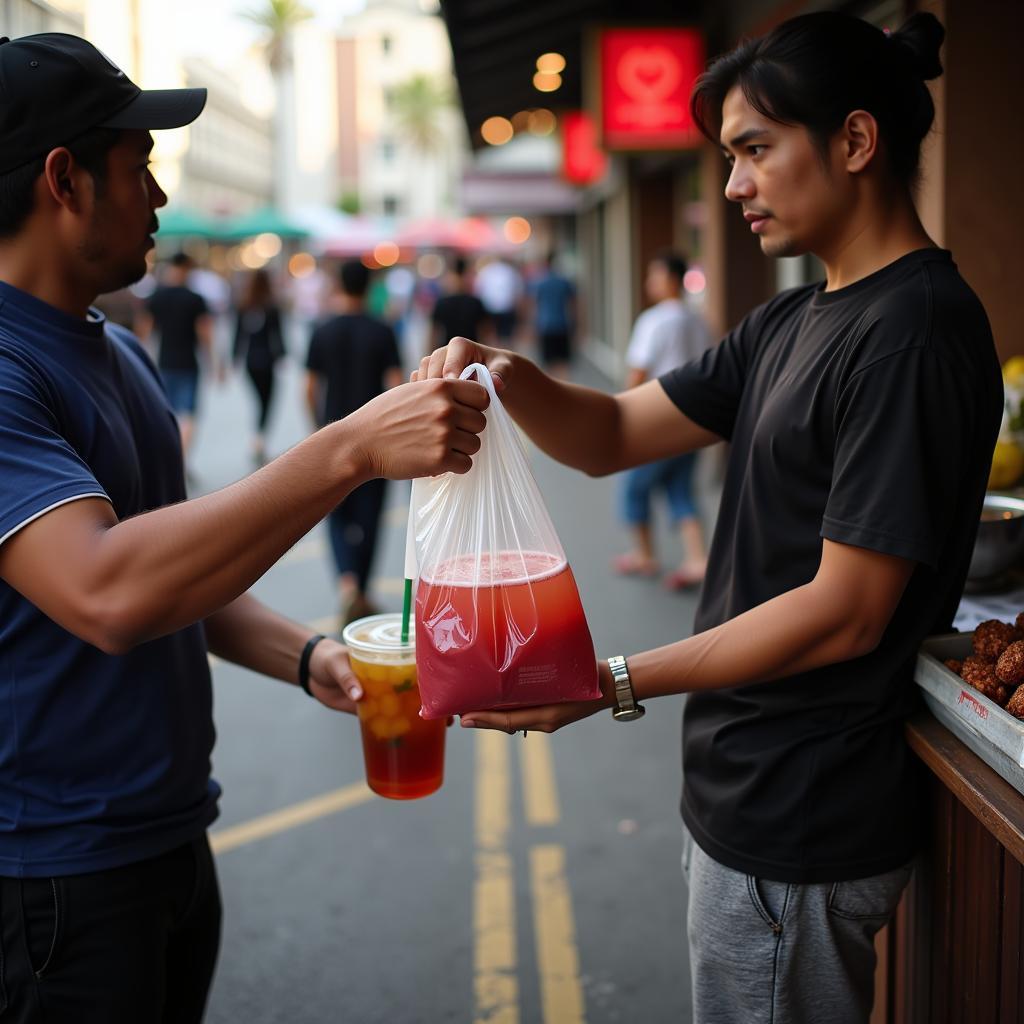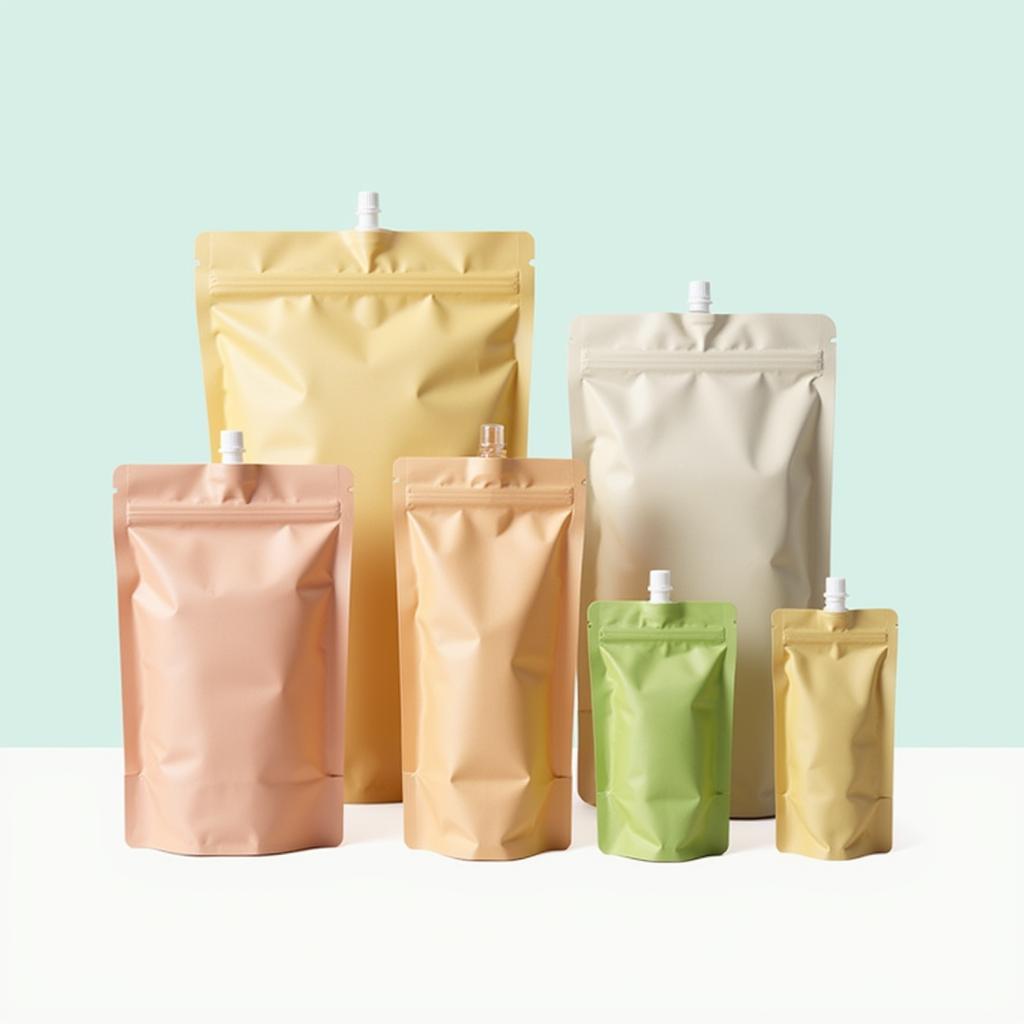Navigating the World of Plastic Beverage Bags
November 9, 2024Plastic Beverage Bags are a common sight in many parts of the world, used for everything from carrying juice to transporting water. Their lightweight and flexible nature makes them a popular choice for consumers and vendors alike. But what are the real implications of using these ubiquitous pouches? This article delves into the world of plastic beverage bags, exploring their various uses, potential environmental impact, and emerging alternatives.
Understanding the Appeal of Plastic Beverage Bags
The popularity of plastic beverage bags stems from their practicality. They are lightweight, easy to transport, and relatively inexpensive to produce. These bags are often sealed with a simple knot or a more sophisticated heat-sealed closure, ensuring the contents remain secure. This makes them a convenient option for on-the-go consumption, particularly in busy urban environments. Imagine grabbing a refreshing juice from a street vendor on a hot summer day. The flexibility of these bags allows them to be easily tucked away in a bag or pocket once emptied. For vendors, these bags are an affordable way to package and sell their products.
 Street vendor selling beverages in plastic bags
Street vendor selling beverages in plastic bags
Furthermore, plastic beverage bags can be easily customized with branding and colorful designs, making them a powerful marketing tool. They come in a variety of sizes, catering to different consumer needs and preferences. From small individual servings to larger family-sized pouches, these bags offer versatility in packaging options. This flexibility has solidified their place in many cultures around the globe. Need a portable drink holder? Plastic beverage bags often fit the bill.
The Environmental Impact of Plastic Beverage Bags
While convenient, the environmental impact of plastic beverage bags is a growing concern. Many of these bags are made from single-use plastics, contributing to the global plastic waste problem. These plastics can take hundreds of years to decompose, polluting landfills and oceans. The production of these bags also requires significant resources, including fossil fuels and water, further exacerbating their environmental footprint. What’s more, discarded plastic bags can pose a threat to wildlife, often mistaken for food and causing harm to animals.
The need for change is clear. Moving towards more sustainable practices is crucial to mitigating the negative effects of plastic beverage bags on our planet. This includes promoting responsible disposal, recycling initiatives, and the development of eco-friendly alternatives.
3 oz plastic bottles with caps
Exploring Sustainable Alternatives
Fortunately, innovative solutions are emerging to address the environmental challenges posed by plastic beverage bags. Biodegradable and compostable plastics derived from renewable resources are gaining traction. These materials offer a more sustainable option, breaking down naturally over time and reducing the burden on landfills. Reusable containers made from materials like glass or stainless steel are also a viable alternative. These durable options promote a reduce-and-reuse mindset, minimizing waste generation.
Another approach involves promoting recycling initiatives and educating consumers about responsible disposal practices. Ensuring proper waste management systems are in place is crucial to capturing and recycling plastic waste effectively. “We must all play our part in reducing plastic waste,” says Dr. Elena Martinez, a leading environmental scientist. “From choosing reusable alternatives to supporting recycling programs, every action counts.”
The Future of Beverage Packaging
The future of beverage packaging is evolving rapidly. Innovation and consumer demand are driving the development of more sustainable and eco-conscious solutions. This includes exploring alternative materials, improving recycling infrastructure, and fostering a culture of responsible consumption. “Consumers are increasingly aware of the environmental impact of their choices,” adds Professor David Lee, a specialist in sustainable packaging. “This growing awareness is pushing the industry to prioritize sustainability and develop innovative packaging solutions.”
 Biodegradable beverage bags displayed on a table
Biodegradable beverage bags displayed on a table
In conclusion, plastic beverage bags, while offering convenience, present significant environmental challenges. By embracing sustainable alternatives, promoting responsible disposal, and fostering innovation, we can work towards a future where beverage packaging is both practical and environmentally sound.
FAQ
-
What are plastic beverage bags made of?
Many are made from low-density polyethylene (LDPE). -
Are plastic beverage bags recyclable?
It depends on local recycling programs. -
What are some eco-friendly alternatives to plastic beverage bags?
Biodegradable bags, reusable containers (glass, stainless steel), and paper-based packaging. -
How long does it take for a plastic beverage bag to decompose?
Hundreds of years. -
What are the environmental concerns associated with plastic beverage bags?
Pollution of landfills and oceans, harm to wildlife, and resource depletion. -
How can I dispose of plastic beverage bags responsibly?
Recycle them if possible or dispose of them in designated trash receptacles. -
What are the benefits of using reusable beverage containers?
Reduced plastic waste, cost savings in the long run, and often better temperature retention.
When you need support, please contact Phone Number: 0963418788, Email: [email protected] Or visit the address: 2M4H+PMH, Nghia Thanh Ward, Gia Nghia, Dak Nong, Vietnam. We have a 24/7 customer service team.